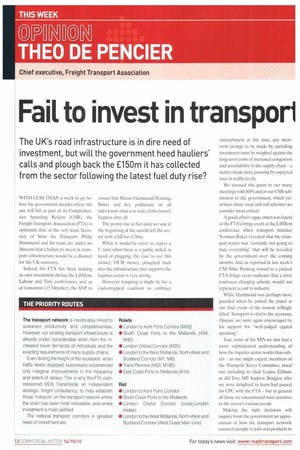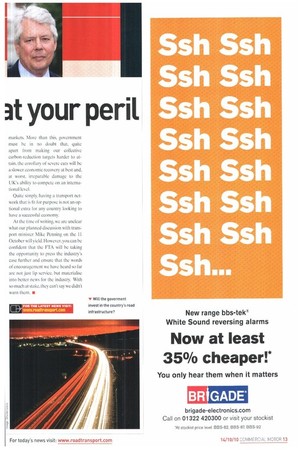Fail to invest in transpori
Page 12

Page 13

If you've noticed an error in this article please click here to report it so we can fix it.
your peril
The UK's road infrastructure is in dire need of investment, but will the government heed hauliers' calls and plough back the £150m it has collected from the sector following the latest fuel duty rise?
W1T11 LESS THAN a week to go before the government decides where the axe will fall as part of its Comprehensive Spending Review (CSR), the Freight Transport Association (FTA) is optimistic that, at the very least, Secretary of State for Transport Philip Hammond and his team are under no illusions that a failure to invest in transport infrastructure would be a disaster for the UK economy.
Indeed, the FIA has been making its own investment during the LibDem. Labour and Tory conferences, and as of tomorrow (15 October), the SNP, to ensure that Messrs Hammond, Penning, Baker and key politicians on all sides know what is at stake if this doesn't happen after all.
The penny rise in fuel duty we saw at the beginning of the month left the sector with a bill for .1:150m.
While it would be naive to expect a U-turn when there is a public deficit in need of plugging, the case to see this money, OUR money, ploughed back into the infrastructure that supports the logistics sector is very strong.
However tempting it might be for a cash-strapped coalition to embrace retrenchment at this time, any shortterm savings to be made by curtailing investment must be weighed against the long-term costs of increased congestion and unreliability in the supply chain a matter made more pressing by expected rises in traffic levels.
We stressed this point in our many meetings with MPs and in our CSR submission to the government, which prioritises those road and rail schemes we consider most critical.
A good, albeit vague, omen was found at the FTA's fringe event at the LibDem conference when transport minister Norman Baker revealed that the transport sector was -certainly not going to hate everything" that will he revealed by the government over the coming months. And as reported in last week's CM, Mike Penning vowed to a packed FTA fringe event audience that a lorry road-user charging scheme would not represent a cost to industry.
While Hammond was perhaps more guarded when he joined the panel at our final event of the season, tellingly titled 'Transport is vital to the economy. Discuss', we were again encouraged by his support for "well-judged capital spending".
True, some of the MPs we met had a more sophisticated understanding of how the logistics sector works than others as one might expect, members of the Transport Select Committee stood out, including its chair Louise Ellman, as did Tory MP Andrew Bridgen, who we were delighted to learn had passed his CPC with the FTA but in general all those we encountered were sensitive to the sector's various needs.
Making the right decisions will require from the government an appreciation of how the transport network connects people to jobs and products to markets. More than this, government must be in no doubt that, quite apart from making our collective carbon-reduction targets harder to attain, the corollary of severe cuts will be a slower economic recovery at best and, at worst, irreparable damage to the 1_11cs ability to compete on an international level.
Quite simply, haying a transport network that is fit for purpose is not an optional extra for any country looking to have a successful economy.
At the time of writing, we are unclear what our planned discussion with transport minister Mike Penning on the 11 October will yield. However, you can be confident that the ETA will be taking the opportunity to press the industry's case further and ensure that the words of encouragement we have heard so far are not just lip service, but materialise into better news for the industry. With so much at stake, they can't say we didn't warn them. •




























































































































